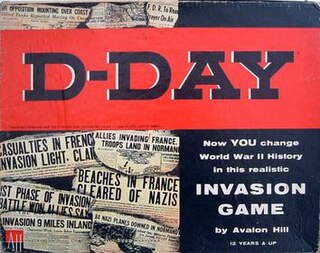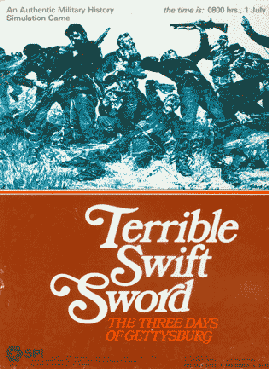
Avalon Hill Games Inc. is a game company that publishes wargames and strategic board games. It has also published miniature wargaming rules, role-playing games and sports simulations. It is a subsidiary of Hasbro, and operates under the company's "Hasbro Gaming" division.
Simulation video games are a diverse super-category of video games, generally designed to closely simulate real world activities. A simulation game attempts to copy various activities from real life in the form of a game for various purposes such as training, analysis, prediction, or entertainment. Usually there are no strictly defined goals in the game, and the player is allowed to control a character or environment freely. Well-known examples are war games, business games, and role play simulation. From three basic types of strategic, planning, and learning exercises: games, simulations, and case studies, a number of hybrids may be considered, including simulation games that are used as case studies. Comparisons of the merits of simulation games versus other teaching techniques have been carried out by many researchers and a number of comprehensive reviews have been published.

A Mind Forever Voyaging (AMFV) is a 1985 interactive fiction game designed and implemented by Steve Meretzky and published by Infocom. The game was intended as a polemical critique of Ronald Reagan's politics.
A government simulation or political simulation is a game that attempts to simulate the government and politics of all or part of a nation. These games may include geopolitical situations, the creation of domestic political policies, or the simulation of political campaigns. They differ from the genre of classical wargames due to their discouragement or abstraction of military or action elements.

The Movies is a business simulation game created by Lionhead Studios for Microsoft Windows and ported to Mac OS X by Feral Interactive. Players run a Hollywood film studio, creating films that can be exported from the game. The Movies was released in November 2005 to positive reviews and several awards, but sold poorly. An expansion, The Movies: Stunts & Effects, was released in 2006.

1776, subtitled "The Game of the American Revolutionary War", is a board wargame published by Avalon Hill in 1974 that simulates the American Revolutionary War. Its release was timed to coincide with the bicentenary of the Revolution, and for several years was a bestseller for Avalon Hill.

D-Day is a board wargame published by Avalon Hill in 1961 that simulates the six months of the European Campaign of World War II from the Normandy Invasion to the crossing of the Rhine. It was the first wargame to feature the now ubiquitous hex grid map and cardboard counters, and was revised and re-released in 1962, 1965, 1971, 1977 and 1991.

The Arab-Israeli Wars, subtitled "Tank Battles in the Mideast 1956–73", is a board wargame published by Avalon Hill in 1977 that simulates various battles during the Suez Crisis, Six-Day War and Yom Kippur War.

Leonard Suransky is a South African doctor of International Relations and Education and is the former Head of the Department of International Relations at Webster University in Leiden, Netherlands. Subsequently, he headed the IR department of Webster University, Accra Ghana from 2014-to 2019, and still teaches there by Zoom in 2022. He is currently the co-chair of the University of the Third Age (U3a), Cape Town, and the Chair of the Camps Bay U3a branch
Business simulation or corporate simulation is simulation used for business training, education or analysis. It can be scenario-based or numeric-based.

Business simulation games, also known as economic simulation games or tycoon games, are games that focus on the management of economic processes, usually in the form of a business. Pure business simulations have been described as construction and management simulations without a construction element, and can thus be called management simulations. Indeed, micromanagement is often emphasized in these kinds of games. They are essentially numeric, but try to hold the player's attention by using creative graphics. The interest in these games lies in accurate simulation of real-world events using algorithms, as well as the close tying of players' actions to expected or plausible consequences and outcomes. An important facet of economic simulations is the emergence of artificial systems, gameplay and structures.

Paradigm Entertainment Inc. was an American video game development company. Paradigm is perhaps best known for its vehicle simulation games. Founded as a 3D computer graphics company in 1990, Paradigm primarily worked on realistic flight simulation technology for major space and aviation clients. The company got its start in game development when it was contacted by Nintendo in 1994 to aid in the creation of one of the Nintendo 64's launch titles, Pilotwings 64. The game was a critical and commercial success for the developer, causing the simulation and entertainment divisions of Paradigm to separate and focus on their respective products. The newly independent Paradigm Entertainment continued to develop for Nintendo's 64-bit console. After a short partnership with Video System, Paradigm was acquired as a wholly owned subsidiary of Infogrames in 2000 and began developing games for sixth-generation video game consoles. Paradigm was sold to THQ in 2006 and was ultimately closed in 2008.

Terrible Swift Sword: Battle of Gettysburg Game is a grand tactical regimental level board wargame published by Simulations Publications, Inc. (SPI) in 1976 that simulates the Battle of Gettysburg during the American Civil War. A second edition was published by TSR in 1986.
A serious game or applied game is a game designed for a primary purpose other than pure entertainment. The "serious" adjective is generally prepended to refer to video games used by industries like defense, education, scientific exploration, health care, emergency management, city planning, engineering, politics and art. Serious games are a subgenre of serious storytelling, where storytelling is applied "outside the context of entertainment, where the narration progresses as a sequence of patterns impressive in quality ... and is part of a thoughtful progress". The idea shares aspects with simulation generally, including flight simulation and medical simulation, but explicitly emphasizes the added pedagogical value of fun and competition.

F1 Racing Simulation is a racing simulation game, developed for Microsoft Windows by Ubisoft in 1997. The game is based on the 1996 Formula One World Championship, and is the first of the Racing Simulation games made by Ubisoft, being the predecessor to Racing Simulation 2, which was released in 1998.

The D.I.C.E. Awards is an award show in the video game industry started in 1998 and commonly referred to in the industry as the video game equivalent of the Academy Awards. The awards are arranged by the Academy of Interactive Arts & Sciences (AIAS) and held during the AIAS' annual D.I.C.E. Summit in Las Vegas. "D.I.C.E." is a backronym for "Design Innovate Communicate Entertain". The D.I.C.E. Awards recognize games, individuals, and development teams that have contributed to the advancement of the multi-billion dollar worldwide entertainment software industry.

Miitopia is a role-playing video game developed and published by Nintendo originally for the Nintendo 3DS. The 3DS version was released in Japan in 2016 and worldwide the following year, with a remastered version being released for the Nintendo Switch in 2021. The game features customizable Mii characters in a turn-based battle system, following the story of a group of heroes battling a character known as the Dark Lord who is stealing the faces of Miitopia's residents. The game received mixed reviews, with critics praising its creative life simulation elements and humor while criticizing its combat system and repetitiveness.
Sage Surratt is an American football tight end for the New Orleans Breakers of the United States Football League (USFL). He was signed by the Detroit Lions as an undrafted free agent after not being selected in the 2021 NFL Draft, and was on their practice squad for 2021. He played college football at Wake Forest.

Global War, subtitled "The War Against Germany and Japan, 1939–45", is a grand strategic and economic board wargame published by Simulations Publications Inc. (SPI) in 1975 that simulates the entire extent of World War II.
The D.I.C.E. Award for Strategy/Simulation Game of the Year is an award presented annually by the Academy of Interactive Arts & Sciences during the academy's annual D.I.C.E. Awards. This award recognizes games "in which user directs or manipulates resources to create a set of conditions that result in success as determined within the confines of the game. These games can offer the user the chance to simulate or to virtually reproduce an experience, real or imaginery, which would require some form of equipment. Strategy games emphasize the planning of tactics rather than the execution." Originally, there were separate awards for strategy games and simulation games, which simulate aspects of the real world.













